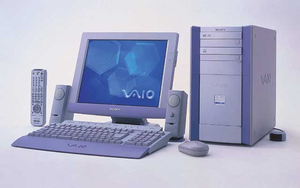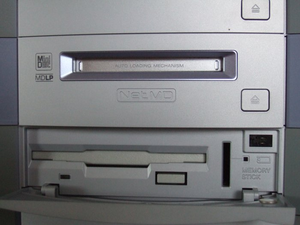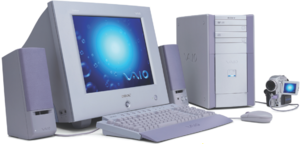PCV-RX: Difference between revisions
More actions
No edit summary |
|||
| Line 1: | Line 1: | ||
This page is currently WIP!! | This page is currently WIP!! | ||
[[File:PCV- | [[File:PCV-RX with LCD.png|alt=PCV-RX with LCD|thumb|PCV-RX with LCD]] | ||
==Overview== | ==Overview== | ||
[[File:NetMD Drive.png|alt=NetMD Drive|thumb| | [[File:PCV-RX NetMD Drive.png|alt=PCV-RX NetMD Drive|thumb|PCV-RX NetMD Drive]] | ||
The Sony VAIO PCV-RX is a series of high-performance, multimedia computers released by Sony from 2000 through 2002. It was a refresh to the previous PCV-R series desktops released in 1999 and 2000. All US configurations included a 3.5" floppy drive behind a door, CD-RW and DVD drives (or in some cases, a DVD-RW drive and a CD drive), i.LINK (IEEE1394) ports on the front and back, a VAIO Smart keyboard, and a mouse. Configurations in Japan typically included one disc drive, while at least one in the UK (PCV-RX403N) included a NetMD drive. Being VAIOs, they included a large number of AV applications for video editing, CD burning, DVD playback, and more. | The Sony VAIO PCV-RX is a series of high-performance, multimedia computers released by Sony from 2000 through 2002. It was a refresh to the previous PCV-R series desktops released in 1999 and 2000. All US configurations included a 3.5" floppy drive behind a door, CD-RW and DVD drives (or in some cases, a DVD-RW drive and a CD drive), i.LINK (IEEE1394) ports on the front and back, a VAIO Smart keyboard, and a mouse. Configurations in Japan typically included one disc drive, while at least one in the UK (PCV-RX403N) included a NetMD drive. Being VAIOs, they included a large number of AV applications for video editing, CD burning, DVD playback, and more. | ||
[[File:PCV-RX650.PNG|alt=PCV-RX650|thumb|PCV-RX with optional CRT]] | [[File:PCV-RX650.PNG|alt=PCV-RX650|thumb|PCV-RX with optional CRT]] | ||
Revision as of 18:53, 28 March 2024
This page is currently WIP!!

Overview

The Sony VAIO PCV-RX is a series of high-performance, multimedia computers released by Sony from 2000 through 2002. It was a refresh to the previous PCV-R series desktops released in 1999 and 2000. All US configurations included a 3.5" floppy drive behind a door, CD-RW and DVD drives (or in some cases, a DVD-RW drive and a CD drive), i.LINK (IEEE1394) ports on the front and back, a VAIO Smart keyboard, and a mouse. Configurations in Japan typically included one disc drive, while at least one in the UK (PCV-RX403N) included a NetMD drive. Being VAIOs, they included a large number of AV applications for video editing, CD burning, DVD playback, and more.

Based off of Sony's marketing, it was aimed at DV editing, capturing still and video images off of camcorders, then cataloging content for fast, easy storage and retrieval.
Detailed Specs
Processor: Pentium III (Coppermine), Pentium 4, Celeron, Athlon (Thunderbird) or Athlon XP
Graphics: Varies, most have a Geforce2 MX, TNT2 M64 or integrated Intel/SiS graphics
Chipset: Varies
Memory: 128MB-512MB (Standard) 512MB-1.5GB (Maximum) DIMM SDRAM, DDR, or RDRAM
Display: Optional 17 inch CRT Monitor or 15-17 inch LCD
Storage: 40-120GB IDE HDD
Weight: unknown
MSRP: unknown
Daily Usage Today
The Sony VAIO PCV-RS is still somewhat usable today for limited tasks, including retro games from the 90s or early 2000s depending on the video card configuration. Most models include an AGP 4x slot. Basic office tasks with a time-appropriate Office suite such as Office 2000, XP, or 2003 are possible. Media playback and ingestion are both options due to all desktops in this series having i.LINK ports and a DVD drive. Web browsing is only an option with websites designed for older computers or a browser capable of browsing some modern websites. All PCV-RX computers have processors with SSE which somewhat helps with browser options.
Resources
PCV-RX260DS Recovery Disc 1 - Recovery Disc 2
